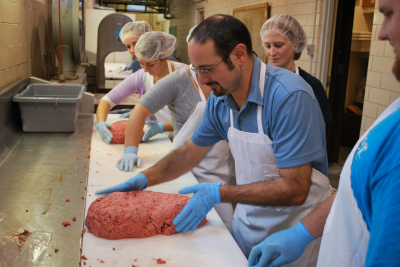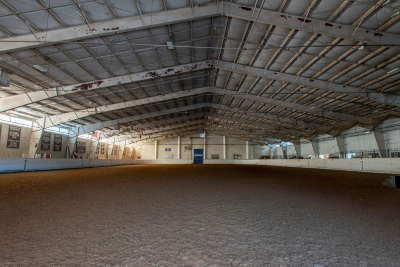
Facilities
The Department of Animal Science at the University of Connecticut is fortunate to have all of its teaching and animal facilities within walking distance of campus. The department maintains teaching and research units for beef cattle, dairy cattle, horses, poultry, sheep and swine. An indoor arena, with seating for 500 people, is available for both teaching and extracurricular activities. Teaching and research are carried out in several modern laboratories including a meats and food products laboratory and a dairy processing plant.
IMPORTANT NOTICE June 4, 2024
We’re happy to share that while the interior of the Kellogg Dairy Center remains closed, visitors can see the robotic milkers in action from a viewing station outside of the building (do not enter the building). Visitors can also view animals on the pastures from Farm Lane and Horsebarn Hill Road, and from outside the livestock unit. Don’t forget to visit the UConn Dairy Bar for ice cream while you’re here!
To learn more about the USDA’s recommendations on increased biosafety measures for dairy and poultry producers due to HPAI (Highly Pathogenic Avian Influenza), please visit the CT Department of Agriculture website: https://s.uconn.edu/hpai

Agricultural Biotechnology Laboratory
The Agricultural Biotechnology Laboratory building (ABL) is adjacent to the George White Building and houses faculty and graduate students from the Department of Animal Science.
This state-of-the-art facility provides undergraduate students with the opportunity for research experiences as Independent Studies, or as paid employees within different laboratories.
George C. White Building
The George C. White building houses the Department of Animal Science and the UConn Creamery. The building contains a "high tech" classroom, teaching laboratory, dairy processing laboratory, research laboratories, offices, conference rooms, and student library. It is used for undergraduate teaching, graduate and undergraduate research, faculty and staff offices and as a meeting place for student clubs in Animal Science.
The Donald M. Kinsman Library is located in the George White Building and is available for all UConn students to use. The library contains scientific journals as well as a variety of livestock journals and magazines. There are a number of computers in the library for student use as well as a Husky Print station for student printing.


Meat Science and Food Products Laboratories
The Meat Science and Food Products Laboratory is located in the Ratcliffe Hicks building adjacent to the George C. White building. The Meat Science Laboratory is used primarily in the manufacturing of processed meat products. Equipment includes grinders, bowl choppers, mixers, steam-jacketed kettles, sausage stuffers, walk-in coolers and freezers, 10-needle cure injectors, smokehouse, and vacuum packager. Immediately adjacent to this is a general kitchen/preparation area, and a 6-unit sensory panel. Sensory assessment of various food products is carried out as part of teaching and research programs within the department.
Ratcliffe Hicks Arena
The Ratcliffe Hicks Arena is a heated, indoor facility (60' x 120') that is located close to the George C. White Building. It seats up to 500 spectators, and is used both for teaching and staging a number of extramural activities.


UConn Creamery
The UConn Department of Animal Science Creamery is located in the George White Building. All of the ice cream sold in the UConn Dairy Bar is produced in the Creamery with fresh milk from UConn’s Kellogg Dairy Center. The Creamery is used for Dairy Foods research, outreach, and teaching activities. Visit the official UConn Creamery page for more information.
Kellogg Dairy Center
The Kellogg Dairy Center (KDC) is a modern free-stall facility capable of accommodating over 100 milking animals (red and white and black and white Holstein and Jersey). The building is equipped with a Voluntary Milking System (VMS; robotic milking system). With robotic milkers, the cows decide when they want to be milked (2 to 6 times per day). When she is ready, the cow will walk into the VMS and be fed a little food based on her needs and current milk production. The robotic arm will then clean and dry her udder, stimulate milk ejection release, milk the cow, and then send her back out into the herd. Robotic feeders are also used to ensure that each cow receives sufficient nutrients to maintain our current DHIA rolling herd averages of approximately 28,000 lbs. for the Holsteins and approximately 19,000 lbs. for the Jerseys.
In addition, the KDC contains a classroom, laboratory, surgical unit, and recovery room. This is an excellent opportunity for students to be exposed to all aspects of dairy management. Learn more about the dairy program.


Cattle Resource Unit
The Cattle Resource Unit (CRU) is located on Horsebarn Hill Road just north of the Swine Facility. It houses replacement heifers for the KDC as well as young beef cattle (Hereford and Angus) and is utilized by the department's teaching, research, and extension programs.
A small laboratory is present and enables researchers to collect and store samples prior to subsequent analysis.
Livestock Unit
The Animal Science Department has teaching, research and demonstration facilities for 45 Angus and Hereford beef cows, 90 Dorset, Shropshire, and Southdown ewes and 30 Yorkshire swine.
Students are responsible for preparing and exhibiting beef cattle and sheep in shows and sales.
The livestock are heavily used in teaching and student hands-on activities.


Poultry Unit
The UConn Poultry Unit provides students the opportunity to study and work with Leghorn egg layers, broilers, and breeders. The buildings house up to 3,000 birds that can be used to brood and rear chicks, grow out young birds, and to house egg layers and meat birds. In the Poultry Resource Unit, opened in 2005, special pens are used for mating specific breeds of chickens for genetic research as well as to test for production qualities. The birds at the farm are used for research, fertile egg production, class work, and club work. Work study, student labor, and internships are available for students interested in gaining experience at the unit.
Horsebarn Hill Arena
Indoor arena (120' x 220') with public viewing area and heated lobby. The Horsebarn Hill Arena is located next to Horse Unit I on Horsebarn Hill Road. It serves as a venue for equine science classes, equestrian competitions, polo matches, club activities, the Little International Livestock and Horse Show.


Horse Unit I
Main equine facility with 58 stalls, 4 tack rooms, club room, classroom, lighted outdoor arena, and training areas. The Department maintains a herd of 70 horses for teaching, equitation, research, and community programs.
Horse Unit II
Research barn with classroom, laboratory and stalls. Primary research and teaching barn and foaling area for the UConn Morgan Breeding Program.


Lorentzon Stables
Located at Horse Unit I, the main unit is used mainly to house and rehabilitate polo horses and UConn Morgan stallions.
Other equine facilities include:
- Main Arena - lighted outdoor arena (100' x 130')
- Trails
- Small outdoor training arena
- Two outdoor round pens
- Turnout sheds and paddocks
The primary bloodlines in today's UConn Morgan Herd are based upon horses initially obtained from the United States Morgan Breeding Farm in the 1930s. The Horse Unit currently breeds five to six mares each year to produce enough foals to support its teaching and research programs.
UConn Morgans are shown and exhibited by our staff and students in many of the major Morgan Breed Shows, and have won many local, national and world championships.